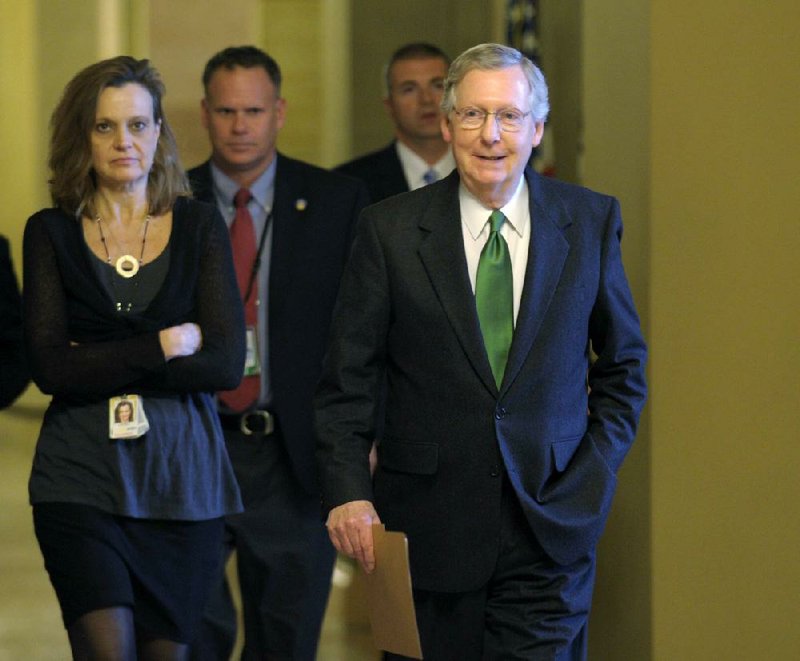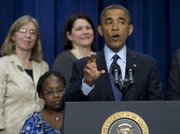WASHINGTON — President Barack Obama and Senate Republicans reached a sweeping deal late Monday that would let income taxes rise significantly for the first time in more than two decades, fulfilling Obama’s promise to raise taxes on the rich and averting the worst effects of the “fiscal cliff.”
Vice President Joe Biden arrived at the Capitol just after 8 p.m. CST to explain the details of the pact he negotiated with Senate Minority Leader Mitch McConnell, R-Ky. A Senate vote on the package could be held after midnight Monday, Democratic aides said. The Republican-controlled House will begin considering the bill today, with a final vote expected in the next day or two.
The agreement emerged after White House officials gave in on the last contested issue, yielding to GOP wishes on how to handle estate taxes, aides said.
The revelations about the pending deal came after Obama had said a deal was “within sight,” and House Republican leaders announced they would hold no votes Monday night, making it appear that the nation would go over the fiscal cliff of tax increases and government spending cuts for at least a day.
The Internal Revenue Service told employers to withhold taxes from paychecks in the assumption that lapsing tax cuts would expire as scheduled, and said it would issue updated tables if Congress passes an extension.
Employers should implement the higher withholding by Feb. 15, the IRS said in a statement issued 12 minutes before midnight Monday.
If the Senate and House approve the deal, many workers would see no effect from the IRS ruling.
The Senate was moving, however, toward a late night on the agreement negotiated by McConnell and Biden.With the House likely to reconvene at noon today, a deal appeared imminent that would cancel historic tax increases for most Americans.
“I think it’s highly likely that some time this evening there’ll be a vote on the Senate side,” Sen. Bob Corker, R-Tenn., said Monday evening as he emerged from a meeting with fellow Republicans. “This is one of those things that could well go into the early morning by the time it goes to a vote. ... I think they’re attempting to get the legislative language in order and vote on it tonight, you know, 1, 2, 3, 4 in the morning, whatever.”
The deal to avert the fiscal cliff will also block a $900 automatic pay increase for members of Congress.
It’s one more reason for lawmakers to vote for the measure extending Bush-era tax cuts on individual income up to $450,000 while increasing rates for earnings above that threshold.
Under a 1989 law, lawmakers are supposed to receive automatic cost-of-living pay increases, but as Congress’ approval ratings have fallen, lawmakers have routinely voted to reject the raise.
Regardless of whether an agreement is reached to avoid the fiscal cliff, many Americans are all but certain to face a broad increase in taxes starting today because of the expiration of the payroll tax cut, which was enacted in 2011 as a temporary measure to boost economic growth. The increased payroll taxes, combined with increases affecting the very wealthy, would effectively mark the end of a prolonged period of declining taxation that has become a defining characteristic of the American economy.
The announcement that the GOP-controlled House would not vote on New Year’s Eve came after Obama urged lawmakers to “stop taxes going up for middle-class families, starting tomorrow,” and he called on them to remain focused on the needs of the American people rather than politics.
In what the White House billed as an event with middle-class Americans, Obama said there were “still issues left to resolve” in the talks.He said he was “hopeful that Congress can get it done. But it’s not done.”
Obama said the potential agreement that Biden and McConnell were crafting would prevent federal income taxes from rising on middle-class families, extend tax credits for children and college tuition, provide tax breaks to clean-energy companies and extend unemployment insurance for 2 million Americans.
He would have preferred to “solve all these problems in the context of a larger agreement,” that would have dealt with spending in a “balanced way,” he said.
“But with this Congress, that was obviously a little too much to hope for at this time,” Obama said, adding that perhaps “we can do it in stages.”
Congressional Republicans immediately pushed back, objecting to comments that one GOP senator described as “heckling Congress.”
The president made the remarks as negotiators moved closer to a deal Monday to avert tax increases for most Americans. But they were still hung up on spending, with Democrats so far resisting Republican proposals for spending cuts that would come in exchange for delaying automatic spending cuts at federal agencies for just three months.
Meanwhile, the U.S. government ran up against its $16.4 trillion borrowing limit and is taking steps to avoid default.
Reaching the limit Monday set up another dispute between the White House and Congress over taxes and spending in the new year.
Treasury Secretary Timothy Geithner said the government will take a series of accounting measures to avoid defaulting on its debt. On Monday, it suspended the issuance of new debt for two government retirement funds.
Last week, Geithner said the measures would save about $200 billion and avoid default for about two months.
Geithner said it is difficult to predict how long default can be avoided because of ongoing negotiations over tax and budget policies.
The debt limit is the amount the government can borrow to help finance its operations.
As Obama prepared to deliver remarks about the fiscal cliff at the White House, negotiators for the administration and McConnell, R-Ky., appeared to have nailed down many of the most critical tax issues, including a plan to let taxes rise on income over $450,000 a year for couples and $400,000 a year for individuals, according to people in both parties familiar with the talks.
McConnell said after Obama’s speech that he and Biden spoke multiple times Monday morning since their first 6:30 a.m. call and managed to resolve their differences on taxes. But he echoed Obama’s contention that the two sides had not yet resolved a dispute about whether to delay automatic spending cuts. McConnell urged Congress to pass the tax agreement - and debate replacing the automatic spending cuts in coming months.
“We’ll continue to work on finding smarter ways to cut spending, but let’s not let that hold up protecting Americans from the tax hike that will take place” on New Year’s Day, he said. “We can do this. We must do this.”
Under the proposed accord that was being hammered out by Biden and McConnell, households earning less than $450,000 would largely escape higher income tax bills, though couples earning more than $300,000 a year and individuals earning more than $250,000 would lose part of the value of their exemptions and itemized deductions.
Low-income households would also benefit from a five-year extension of credits for college tuition and the working poor first enacted as part of Obama’s stimulus package in 2009. And businesses would see a variety of popular tax breaks extended, including a credit for research and development.
The tax on inherited estates would rise from 35 percent to 40 percent, though Democrats agreed to keep in place the current exemption for estates worth up to $5 million. And nearly 30 million households would be protected from paying the costly alternative minimum tax for the first time - either on their 2012 tax returns or at any time in the future. The developing agreement calls for a permanent fix.
The two sides also appeared to have reached consensus on unemployment benefits, with Republicans acceding to Democratic demands to keep benefits flowing to the long-term unemployed for another year. Medicare payments would not be cut for doctors this year, and the cost of preserving those programs would not be offset with other spending cuts.
However, negotiators were still at odds over how to handle the automatic spending cuts, which are set to decimate budgets at the Pentagon and other federal agencies in the new year. Democrats initially demanded that the cuts be delayed until 2015, but Republicans balked, arguing that the cost of any delay should be covered through additional spending cuts.
Instead of delaying the cuts for two years, at a cost of more than $200 billion, Republicans suggested delaying the sequester for three months - at a cost of $33 billion, according to people close to the talks. It was unclear Monday whether the hang-up was the brevity of the extension or the need to identify offsetting spending cuts.
All told, the proposal would raise about $600 billion in new revenue over the next decade from the wealthiest 2 percent of households - less than Obama had been seeking, and less than Boehner, R-Ohio, had offered in negotiations last month. But the new tax revenue was a first step, Democrats said, toward asking the wealthy to do their part in reducing record budget deficits.
In his remarks, Obama highlighted progress in the fiscal cliff talks by noting that “just last month Republicans in Congress said they would never agree to raise tax rates on the wealthiest Americans.” He continued: “Obviously, the agreement that’s currently discussed would raise those rates and raise them permanently.”
He stressed that tax increases represent only one part of the fiscal cliff.
“I want to make clear that any agreement we have to deal with these automatic spending cuts that are being threatened, those also have to be balanced,” Obama said. “And that means the revenues have to be part of the equation in turning off the sequester and eliminating these automatic spending cuts.” Information for this article was contributed by Lori Montgomery, Paul Kane, William Branigin, Ed O’Keefe, Zachary A. Goldfarb and Rosalind S. Helderman of The Washington Post and by Christopher S. Rugaber and Andrew Taylor of The Associated Press.
Front Section, Pages 1 on 01/01/2013


